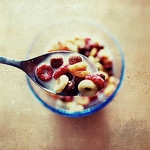Breakfast and Weight Loss
Posted by Janine Wong MS, RD on January 21, 2013

The Starting Line:
What type of breakfast is the most beneficial for weight loss?
Breakfast is the most important meal of the day. It has become a cliche, but years of research support it. However, the frequency of skipping breakfast has increased from 14% in 1965 to 25% in 1991. Some people believe that cutting breakfast is an easy way to limit calories and lose weight. Studies have found that this strategy only works for less than 5% of people who successfully lose weight (Wyatt, et al). Research indicates that even though breakfast-skippers may have a lower daily caloric intake, they still have higher BMIs than regular breakfast-eaters (Cho, et al). Related studies explain that breakfast eaters burn more calories from physical activity than breakfast skippers (Wyatt, et al).
Not all breakfasts are created equal. Retrospective research indicates that people who have cereal or quick breads (pancakes, waffles, french toast, cakes, cookies, pies, pastries) for breakfast have significantly lower BMIs than breakfast-skippers and people who eat other types of breakfast, such as meat and eggs. (Cho, et al). This does not necessarily mean that protein for breakfast is bad. High fat proteins such as bacon, sausage, and fried eggs may explain the higher BMIs in this breakfast group.
In fact, protein is an important part of breakfast. A recent study by Jakubowicz, et al compared a low calorie, low carbohydrate breakfast to a high carbohydrate, high protein breakfast in two groups of overweight or obese people. Total calorie intake across meals between the two groups was kept the same. Each group also received 16 weeks of counseling from a dietitian while on the study diet, then they were followed for an additional 16 weeks. Both groups were able to lose weight through the first 16 weeks; however, the group eating the high carbohydrate, high protein breakfast showed lower levels of ghrelin (the hunger stimulating hormone), lower hunger scores, better adherence to the diet, and were able to continue to lose weight for all 32 weeks of the study. By contrast, the group receiving the low calorie, low carbohydrate breakfast had no change in ghrelin levels, increased hunger scores at the end of the study, and actually re-gained weight in the last half of the study, almost approaching baseline levels. In short, both groups were able to achieve short term weight loss, but eating a higher carbohydrate and protein breakfast promotes adherence to total daily caloric restriction and result in more weight loss.
The Finish Line:
Any breakfast is better than no breakfast. Focus on carbohydrates and lean protein for breakfast to improve weight loss.
References:
1. Wyatt, H.R., Grunwald, G.K., Mosca, C.L., Klem, M.L., Wing, R.R., Hill, J.O. Long-Term Weight Loss and Breakfast in Subjects in the National Weight Control Registry. Obesity Research. 2002, 10(2):78-82. http://www.ncbi.nlm.nih.gov/pubmed?term=Obesity%20Research.%202002%2C%2010(2)%3A78-82.
2. Cho, S., Dietrich, M., Brown, C.J.P., Clark, C.A., Block, G. The Effect of Breakfast Type on Total Daily Energy Intake and Body Mass Index: Results from the Third National Health and Nutrition Examination Survey (NHANES III). Journal of the American College of Nutrition. 2003, 22(4):296-302. http://www.ncbi.nlm.nih.gov/pubmed?term=Journal%20of%20the%20American%20College%20of%20Nutrition.%202003%2C%2022(4)%3A296-302.
3. Jakubowicz, D., Froy, O., Wainstein, J., Boaz, M. Meal timing and composition influence ghrelin levels, appetite scores and weight loss maintenance in overweight and obese adults. Steroids. 2012, 77:323-331. http://www.ncbi.nlm.nih.gov/pubmed/22178258
Photo credit: Shermeee via photopin cc
*Note: This general information is not intended to be a substitute for medical treatment or advice. Always consult a professional before making changes to your health and wellness practices.
Feedback or suggestions for future topics? Let us know!

